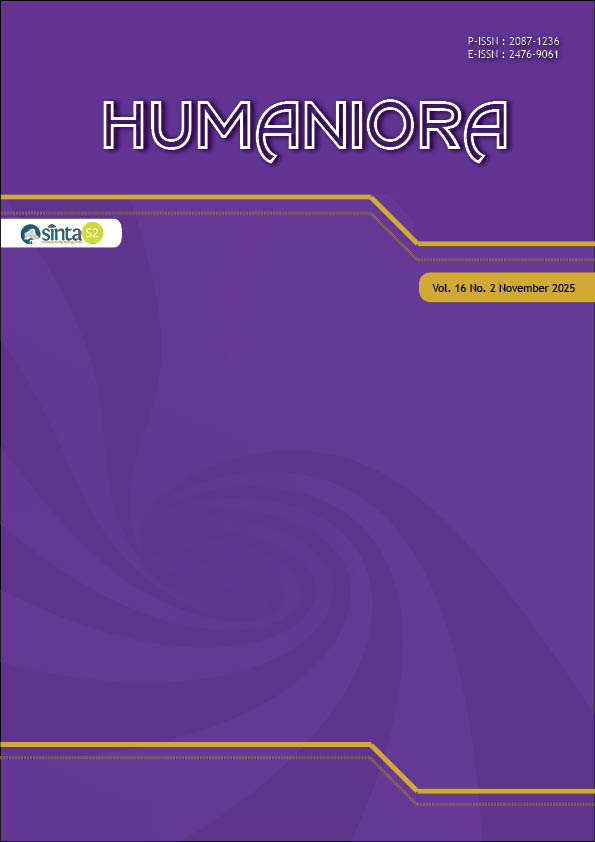Socio Cultural Dynamics and Double Precarity from The DIY Music Scene in Purwokerto, Indonesia
DOI:
https://doi.org/10.21512/humaniora.v16i2.13351Keywords:
DIY music scene, Global South, provincial city, double precarity, global risk generationAbstract
The research explores the socio-cultural dynamics and double precarity faced by Voicehell, a do-it-yourself (DIY) music scene based in Purwokerto. It provides an in-depth examination of the intersecting forms of precarity experienced by a collective of young people, conceptualized as an intermediate generation navigating their life choices within the broader context of the global risk generation. Using a qualitative method combined with a biographical approach, the research presents a reflective biography of the youth involved with Voicehell. The findings reveal that the collective negotiates various manifestations of capital, which may undermine their authenticity and authority as a DIY music scene. Notably, the research does not present a simplistic account of Voicehell's challenges. Instead, it demonstrates that their distinctive position within both a provincial city and the broader Indonesian context exposes them to double precarity. The research further illustrates how such conditions may also affect other Indonesian youth groups, as well as those in the Global North, where collectives frequently contend with spatial inadequacies rooted in underdeveloped socio-economic contexts. These structural limitations sustain their position within the global risk generation. By analyzing the case of Voicehell, the research contributes to a deeper understanding of youth cultures and their negotiation of authenticity, authority, and precarity in a globalized world.
References
Antonilli, A. (2022). World risk society and Ulrich Beck’s manufactured uncertainties. Italian Sociological Review, 12(Special Issue 8), 907-930. https://doi.org/10.13136/isr.v12i8S.594
Beck, U. (2016). The metamorphosis of the world. Polity Press.
Bennett, A., & Kahn-Harris, K. (2004). Unspectacular subculture? Transgression and mundanity in the global extreme metal scene. In A. Bennett & K. Kahn-Harris (Eds.), After subculture: Critical studies in contemporary youth culture (pp. 107-118). Palgrave Macmillan.
Bessant, J. (2020). Making-up people: Youth, truth and politics. Routledge. https://doi.org/https://doi.org/10.4324/9780429296970
Bloomer, R., Brown, A. A., Winters, A. M., & Domiray, A. (2021). “Trying to be everything else”: Examining the challenges experienced by youth development workers. Children and Youth Services Review, 129, 106213. https://doi.org/10.1016/J.CHILDYOUTH.2021.106213
Bloustien, G., & Peters, M. (2011). Youth, music and creative cultures. New York: Palgrave Macmillan.
Blustein, D. L., Lysova, E. I., & Duffy, R. D. (2023). Understanding decent work and meaningful work. Annual Review of Organizational Psychology and Organizational Behavior, 10, 289-314. https://doi.org/10.1146/annurev-orgpsych-031921-024847
Boland, T. (2024). Career transformations: How career guidance counseling understands the labour market. Irish Journal of Sociology, 32(1-2), 205-224. https://doi.org/10.1177/07916035241264081
Churchill, B., & Khan, C. (2021). Youth underemployment: A review of research on young people and the problems of less(er) employment in an era of mass education. Sociology Compass, 15(10), 1-14. https://doi.org/10.1111/soc4.12921
Crossley, N. (2023). Doing it with others: The social dynamics of Do-It-Yourself musicking. DIY, Alternative Cultures & Society, 1(1), 90-106. https://doi.org/https://doi.org/10.1177/27538702231153112
Everts, R., Hitters, E., & Berkers, P. (2022). The working life of musicians: Mapping the work activities and values of early-career pop musicians in the Dutch music industry. Creative Industries Journal, 15(1), 97-117. https://doi.org/10.1080/17510694.2021.1899499
Fahmi, F. Z., McCann, P., & Koster, S. (2017). Creative economy policy in developing countries: The case of Indonesia. Urban Studies, 54(6), 1367-1384. https://doi.org/10.1177/0042098015620529
Farrugia, D. (2021a). Youth, work and ‘career’ as a way of talking about the self. Work, Employment and Society, 35(5), 856-871. https://doi.org/10.1177/0950017020947576
Farrugia, D. (2021b). Youth, work and global capitalism: New directions. Journal of Youth Studies, 24(3), 372-387. https://doi.org/10.1080/13676261.2020.1729965
Gamble, S. (2021). How music empowers: Listening to modern rap and metal. Taylor & Francis.
Guerra, P. (2020). Other scenes, other cities and other sounds in the global south: DIY music scenes beyond the creative city. Journal of Cultural Management and Cultural Policy / Zeitschrift Für Kulturmanagement Und Kulturpolitik, 6(1), 55-76. https://doi.org/10.14361/zkmm-2020-0104
Guerra, P. (2021). So close yet so far: DIY cultures in Portugal and Brazil. Cultural Trends, 30(2), 122-138. https://doi.org/10.1080/09548963.2021.1877085
Guerra, P. (2024). No more heroes: Portuguese Punk and the notion of subculture in the global south. In J. P. Williams (Ed.), Interpreting subcultures: Approaching, contextualizing, and embodying sense-making practices in alternative cultures (pp. 59-74). Bristol University Press. https://doi.org/https://doi.org/10.51952/9781529218640.ch004
Haug, S., Braveboy-Wagner, J., & Maihold, G. (2021). The ‘global south’ in the study of world politics: Examining a meta category. Third World Quarterly, 42(9), 1923-1944. https://doi.org/10.1080/01436597.2021.1948831
Hesmondhalgh, D., & Baker, S. (2010). 'A very complicated version of freedom': Conditions and experiences of creative labour in three cultural industries. Poetics, 38(1), 4-20.
Hodkinson, P. (2015). Youth cultures and the rest of life: Subcultures, post-subcultures and beyond. Journal of Youth Studies, 19(5), 629-645. https://doi.org/10.1080/13676261.2015.1098778
Hrytsiuk, I., Magdysyuk, L., Zamelyuk, M., & Podoliak, I. (2021). Peculiarities of professional culture development in modern youth in Ukraine. Youth Voice Journal, 11, 1-19.
Istiqamah, I. (2019). Analisis pinjaman online oleh fintech dalam kajian hukum perdata. Jurisprudentie: Jurusan Ilmu Hukum Fakultas Syariah Dan Hukum, 6(2), 291-306. https://doi.org/10.24252/jurisprudentie.v6i2.10501
Jones, E. (2021). DIY and popular music: Mapping an ambivalent relationship across three historical case studies. Popular Music and Society, 44(1), 60-78. https://doi.org/10.1080/03007766.2019.1671112
Lee, S. S. Y., & Baek, S. H. (2025). Beyond the precariat: Trajectories of precarious work and its determinants in South Korea. International Journal of Social Welfare, 34(2), 1-15. https://doi.org/10.1111/ijsw.12694
Lukisworo, A. A., & Sutopo, O. R. (2021). Musik bukan pekerjaan: Distingsi dan transgresi dalam karier bermusik musisi metal ekstrem Yogyakarta. Jurnal Studi Pemuda, 10(1), 18-34. https://doi.org/10.22146/studipemudaugm.65429
Luvaas, B. (2009). Generation DIY: Youth, class, and the culture of indie production in digitalage Indonesia. University of California.
Luvaas, B. (2012). DIY styles: Fashion, music and global digital cultures. New York: Berg.
Luvaas, B. (2013). Exemplary centers and musical elsewheres: on authenticity and autonomy in Indonesian indie music. Asian Music, 44(2), 95-114. https://doi.org/10.1353/amu.2013.0011
Mackenzie, E., & McKinlay, A. (2021). Hope labour and the psychic life of cultural work. Human Relations, 74(11), 1841-1863. https://doi.org/10.1177/0018726720940777
Martin-Iverson, S. (2021). The value of the underground: Punk, politics, and creative urbanism in Bandung, Indonesia. Cultural Studies, 35(1), 110-135. https://doi.org/10.1080/09502386.2020.1844261
McKay, G. (2024). Was punk DIY? Is DIY punk? Interrogating the DIY/punk nexus, with particular reference to the early UK punk scene, c.1976-1984. DIY, Alternative Cultures & Society, 2(1), 94-109. https://doi.org/10.1177/27538702231216190
Musgrave, G. (2023). Musicians, their relationships, and their wellbeing: Creative labour, relational work. Poetics, 96(January), 101762. https://doi.org/10.1016/j.poetic.2023.101762
Mutahir, A., Chusna, A., Rizkidarajat, W., Taufiqurrohman, M., & Makhasin, L. (2024). Korean street food in contemporary Indonesia: Glocalization in a semi-medium city. Jurnal Sosiologi Dialektika, 19(2), 182-198. https://doi.org/10.20473/jsd.v19i2.2024.182-198
Oliveira, A. (2023). DIY or die? A typology of DIY careers in the Portuguese independent music scenes. DIY, Alternative Cultures & Society, 1(1), 20-33. https://doi.org/10.1177/27538702231153118
Pramitha asti, N. putu M. dewi. (2020). Upaya hukum Otoritas Jasa Keuangan (OJK) dalam mengatasi layanan pinjaman online ilegal. Acta Comitas, 5(1), 111-122. https://doi.org/10.24843/ac.2020.v05.i01.p10
Rizkidarajat, W. (2016). Kabar dari akar Rumput: Metal hari ini. Serunai.Co. https://serunai.co/2016/08/31/kabar-dari-akar-rumput-metal-hari-ini/
Rizkidarajat, W., Isna, H. P., Nethania, R., & Aulia, P. M. (2023). Contextualization of risk society in the reality of digital work in Purwokerto, Central Java, Indonesia. Revista Nuestramerica, 22, 1-21. https://doi.org/https://doi.org/10.5281/zenodo.10627713
Rizkidarajat, W., Mutahir, A., Hanny, I., & Caceres-correa, I. (2024a). Urban space spatiality in Purwokerto, Jawa Tengah: Case from Gedung Soetedja. Jurnal Ilmiah Ilmu Sosial Sosiohumaniora, 10(February), 118–137.
Rizkidarajat, W., Rahmadona, A. E., & Geminove, M. J. (2024b). Kolektif pemuda dan placemaking: Penciptaan ruang alternatif oleh Heartcorner Collective, Purwokerto. Jurnal Penelitian Inovatif, 4(2), 205-216.
Rizkidarajat, W., Mutahir, A., Hanny, I., Putri, A. (2024c). Praktik kesalehan pemuda pada kota provincial: Studi pada majelis At Tho’at. Jurnal Ilmu Agama, 7(3), 1-16. https://doi.org/10.37329/kamaya.v7i3.3429
Rizkidarajat, W., Mutahir, A., Restuadhi, H., & Julianti, S. (2025). Kerja atau karier: Studi biografi pada strategi musisi DIY dalam menghadapi pilihan kemiskinan di Purwokerto, Jawa Tengah. Sosiohumaniora, 11(February), 122-140. https://doi.org/https://doi.org/10.30738/sosio.v11i1.18061
Sastradinata, D. N. (2020). Aspek hukum lembaga pinjaman online ilegal di Indonesia. Jurnal Independent, 8(1), 293–301. https://doi.org/10.30736/ji.v8i1.115
Sutopo, O. R. (2019). Mobility, capital and youth transitions in Indonesia. In Youth, inequality and social change in the global south, perspectives on children and young people (pp. 179-190). Singapore: Springer. https://doi.org/10.1007/978-981-13-3750-5_12
Sutopo, O. R., & Jesica, E. S. (2025). Pengantar perspektif kepemudaan: Transisi, budaya, dan generasi sosial. Yogyakarta: Gadjah Mada University Press.
Sutopo, O. R., & Lukisworo, A. A. (2020). Praktik bermusik musisi muda dalam skena metal ekstrem. Jurnal Sosiologi Pendidikan Humanis, 54(6), 107-119. https://doi.org/10.17977/um021v5i2p107-119
Sutopo, O. R., & Lukisworo, A. A. (2023). Praktik pertunjukan musik mandiri dalam skena metal ekstrem. Resital, 24(2), 97-111. https://doi.org/https://doi.org/10.24821/resital.v24i2.8328
Sutopo, O. R., Nilan, P., & Threadgold, S. (2017). Keep the hope alive: Young Indonesian musicians’ views of the future. Journal of Youth Studies, 20(5), 549-564. https://doi.org/10.1080/13676261.2016.1241871
Sutopo, O. R., Wibawanto, G. R., & Lukisworo, A. A. (2020a). Melampaui subkultur/post-subkultur: Musisi sebagai jalan hidup kaum muda. Jurnal Studi Pemuda, 9(1), 1-12. https://doi.org/10.22146/studipemudaugm.55325
Sutopo, O. R., Wibawanto, G. R., & Lukisworo, A. A. (2020b). Resist or perish! Understanding the mode of resistance among young DIY Indonesian musicians. Perfect Beat, 20(2), 116-133. https://doi.org/10.1558/prbt.40851
Threadgold, S. (2018). Creativity, precarity and illusio: DIY cultures and ‘choosing poverty.’ Cultural Sociology, 12(2), 156-173. https://doi.org/10.1177/1749975517722475
Verbuč, D. (2021). DIY House Shows and Music venues in the US: Ethnographic explorations of place and community. Routledge. https://doi.org/10.4324/9781003201090
Walzer, D. (2023). Towards an understanding of creativity in independent music production. Creative Industries Journal, 16(1), 42-55. https://doi.org/https://doi.org/10.1080/17510694.2021.1960705
Whiting, S. (2021). The value of small live music venues: Alternative forms of capital and niche spaces of cultural production. Cultural Sociology, 15(4), 558-578. https://doi.org/10.1177/17499755211021307
Woodman, D. (2020). Social change and generation. In J. Wyn & et.al (Eds.), Youth and the new adulthood generations of change (pp. 31-46). Springer Singapore. https://doi.org/https://link.springer.com/chapter/10.1007/978-981-15-3365-5_3
Downloads
Published
How to Cite
Issue
Section
License
Copyright (c) 2025 Wiman Rizkidarajat, Arizal Mutahir, Aidatul Chusna, Kholifatus Saadah

This work is licensed under a Creative Commons Attribution-ShareAlike 4.0 International License.
Authors who publish with this journal agree to the following terms:
a. Authors retain copyright and grant the journal right of first publication with the work simultaneously licensed under a Creative Commons Attribution License - Share Alike that allows others to share the work with an acknowledgment of the work's authorship and initial publication in this journal.
b. Authors are able to enter into separate, additional contractual arrangements for the non-exclusive distribution of the journal's published version of the work (e.g., post it to an institutional repository or publish it in a book), with an acknowledgment of its initial publication in this journal.
c. Authors are permitted and encouraged to post their work online (e.g., in institutional repositories or on their website) prior to and during the submission process, as it can lead to productive exchanges, as well as earlier and greater citation of published work.
USER RIGHTS
All articles published Open Access will be immediately and permanently free for everyone to read and download. We are continuously working with our author communities to select the best choice of license options, currently being defined for this journal as follows: Creative Commons Attribution-Share Alike (CC BY-SA)


















